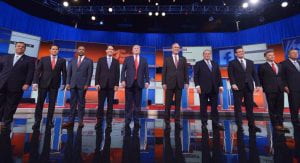BY SARAH HOLLOWAY – STAFF WRITER
Last month, Fox News broke records with their coverage of “Round One” of the Republican Primary debates with 25.1 million viewers tuning in every minute, making it the highest-rated non-sports program in cable history. Compared to the primary debates of 2012, which attracted a few million at best, the people of America are truly invested in this year’s presidential election – or at least looking for some quality entertainment.
With such hard-hitting questions as “How would you describe the Democratic frontrunner in two words?” the debate was more of a ratings grab than a discussion of policy. The commercialization of news channels like Fox News and CNN is affecting the quality of the news presented, as seen in the recent GOP primaries. It has become a battle of news versus entertainment as important questions concerning policy and potential action of candidates go uncovered in the name of catering to the younger, hipper demographic.
Front runner for the GOP candidates and reality T.V. star Donald Trump credits himself with the ratings spike, and news networks seem to agree. Trump dominated the CNN primary, getting 78 percent more speaking time than other candidates—further highlighting the network’s priority of ratings over content. The Wall Street Journal estimated that CNN received “around $150,000 per 30 second commercial,” indicating a clear monetary motive to maximize ratings.
The repercussions of these sensationalized debates fall on the voting population. The purpose of the debates is to give voters a sense of each candidate’s aptitude for handling the most controversial issues they would be potentially faced with as president; it is an opportunity for America to become educated on the stances and plans of the candidates in order to make a more informed vote. However, in this entertainment-and-profit-margin-minded media, candidates are rewarded for their wow-factor despite being uninformed on pressing issues that potential presidents should be concerned with, exemplified by Trump’s ignorance of ISIS and al-Qaeda leaders.

An argument can be made that the media is simply giving the people what they want—presenting the debates in a way that interests the majority increases citizen participation in the election process.
“More viewers motivates the party base, which makes an impact in the primary level,” Assistant Professor of Politics Dr. Benjamin Knoll said on the issue of commercialized portrayal of the debates. “Yes, I would rather it not be have to be commercialized to gain interest, but in reality is does little harm.”
While it is undisputedly true that more people are viewing the debates, whether they learn anything about the candidates is another case entirely.
“It’s all about who is more witty and quick off the draw, who can get in their ten second sound bite,” president of Centre Democrats and senior politics major Dennis Barrett said. “The debates lack substantive discussion of policy program and comprehensive plans for the future of America. There is more participation, but not the kind you want.”
Though it is discouraging that these critical debates must be made into huge productions to reach the majority of the country, there are also more sophisticated sources of information available to this generation.
“You can be watching the debate on CNN and simultaneously fact-checking on Reddit, Assistant Professor of International Studies Dr. Robert Bosco said. “The problem is if you watch the mainstream media and then stop thinking.”
However, Dr. Bosco feels the real issue is rooted in any attempt at media coverage of primary debates.
“It’s not dangerous to have commercialized debates; you just can’t call it a debate,” he said.
“20 candidates squeezing in one-liners stating their positions is not a debate, and trying to have a real debate with that many candidates is too messy for T.V.”
Despite their many shortcomings, the debates will continue to be influential aspects of presidential elections for the foreseeable future. It’s doubtful that much can be done to stop the money train of commercialized media coverage, but steps can be taken to make the debates more relevant and informative. Eliminating low quality questions that elicit no valuable response would make room for more meaningful discussion of policy and controversial issues that have real impact on the lives of Americans.
Though the ratings of the Democratic primaries may be lacking without Donald Trump to shock the debate into a live-streamed, live-tweeted reality show, hopefully this will be made up for in relevant, substantive discussion of future of this nation.
